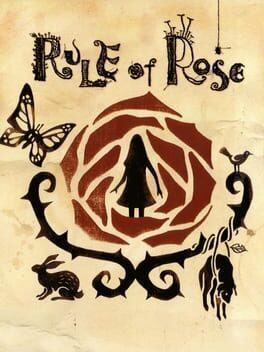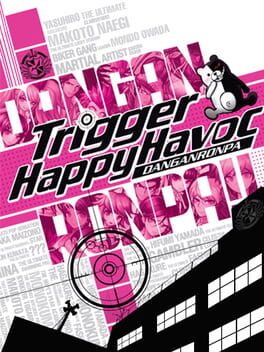RaphaeLoko7478
2 reviews liked by RaphaeLoko7478
Rule of Rose
2006
Danganronpa is one of those franchises I had always heard its community raving about but never got around to it. As a recent admirer of visual novels (Zero Escape Trilogy), I decided with the Decadence release on Switch to give the trilogy its fair shake. While not everything is a grand slam, Danganronpa sets the tone for being a deeply disturbing set of mysteries, logical fallacies, and despair.
You play as Makoto, an average high school student picked to be amongst 14 other "Ultimate" high school classmates, from the Ultimate Baseball Star to the Ultimate Programmer, and the Ultimate Affluent Prodigy. The broad stereotypes and large cast of characters keeps the game compelling, and allows for players to gravitate towards a cast that they enjoy spending time with. That doesn't last long though, and students start dying, subjecting the rest of the survivors as suspects AND investigators in a roundabout whodunit class trial. The constant tension of your favorite hero being the next to go is thrilling and depressing, and may be a lot for some fans of lighter visual novels. I was told to not get too attached, and while that is true, there are definitely a few exceptions and I think the game has a nice balance of power.
The actual game swaps between three modes. At its core is a visual novel, where large chunks of dialogue will play out. This is the foundation of the game, so if you aren't a fan of reading or long stretches of not fully voiced text, this may not be for you. When a murder occurs, the game switches to investigation mode, prompting you to find clues and alibis around Hope's Peak High School to gather as much evidence as possible. This functions like any point-and-click detective game, including the Phoenix Wright games. Also similar to Phoenix Wright are the class trials, which put all of the students head to head to contradict and deduce the truth behind each case. The back and forth is always exciting, but the game sometimes fails in establishing what order of events it wants to solve, or why a clue is more relevant than another. The trials also contain many minigames to get answers, from a rhythm game to a hangman-like word guesser. Not all of these land unfortunately, and end up muddying and prolonging what could be a snappy set of thrilling cases. Finally, you get free time periods between major cases to hang out with the other students. Developing relationships involves gaining skills to use in trials, gifting presents, and learning more about the characters. These things end up becoming very tacked on, and much of the time spent here feels wasted and unnecessary. If selectt conversations could have been chosen, gaining skills to rank up as the story naturally progressed, or if gift giving would provide some additional benefit, this would cut out a significant portion of dead air. Instead, free time acts as a half-baked Persona clone.
The look and feel of the game is mostly excellent. Music is simultaneously upbeat and raunchy, matching the cute anime style with the gory underbelly of murder. Navigating Hope's Peak takes some getting used to, as the first person controls take a little getting used to, but most of the time, you can either quickly fast travel or not be walking around for too long. This game falls into the trap of writing too much to explain things, but sometimes doesn't go far enough to explain its more interesting concepts. This applies to a few narrative beats, which I'm hoping will have some resolution in the sequels.
While the first Danganronpa had its share of small issues and grievances, I overall relaly enjoyed solving the mysteries at Hope's Peak. I appreciated that the game allowed me to have all the clues to solve cases well in advance of the heroes, just waiting for me to pull the trigger on the correct suspect. I wouldn't call the game easy though, presenting a fair set of logical hurdles to discover within each trial. I hope that the sequels will improve even further upon this twisted formula, but this was strong start for Danganronpa.
You play as Makoto, an average high school student picked to be amongst 14 other "Ultimate" high school classmates, from the Ultimate Baseball Star to the Ultimate Programmer, and the Ultimate Affluent Prodigy. The broad stereotypes and large cast of characters keeps the game compelling, and allows for players to gravitate towards a cast that they enjoy spending time with. That doesn't last long though, and students start dying, subjecting the rest of the survivors as suspects AND investigators in a roundabout whodunit class trial. The constant tension of your favorite hero being the next to go is thrilling and depressing, and may be a lot for some fans of lighter visual novels. I was told to not get too attached, and while that is true, there are definitely a few exceptions and I think the game has a nice balance of power.
The actual game swaps between three modes. At its core is a visual novel, where large chunks of dialogue will play out. This is the foundation of the game, so if you aren't a fan of reading or long stretches of not fully voiced text, this may not be for you. When a murder occurs, the game switches to investigation mode, prompting you to find clues and alibis around Hope's Peak High School to gather as much evidence as possible. This functions like any point-and-click detective game, including the Phoenix Wright games. Also similar to Phoenix Wright are the class trials, which put all of the students head to head to contradict and deduce the truth behind each case. The back and forth is always exciting, but the game sometimes fails in establishing what order of events it wants to solve, or why a clue is more relevant than another. The trials also contain many minigames to get answers, from a rhythm game to a hangman-like word guesser. Not all of these land unfortunately, and end up muddying and prolonging what could be a snappy set of thrilling cases. Finally, you get free time periods between major cases to hang out with the other students. Developing relationships involves gaining skills to use in trials, gifting presents, and learning more about the characters. These things end up becoming very tacked on, and much of the time spent here feels wasted and unnecessary. If selectt conversations could have been chosen, gaining skills to rank up as the story naturally progressed, or if gift giving would provide some additional benefit, this would cut out a significant portion of dead air. Instead, free time acts as a half-baked Persona clone.
The look and feel of the game is mostly excellent. Music is simultaneously upbeat and raunchy, matching the cute anime style with the gory underbelly of murder. Navigating Hope's Peak takes some getting used to, as the first person controls take a little getting used to, but most of the time, you can either quickly fast travel or not be walking around for too long. This game falls into the trap of writing too much to explain things, but sometimes doesn't go far enough to explain its more interesting concepts. This applies to a few narrative beats, which I'm hoping will have some resolution in the sequels.
While the first Danganronpa had its share of small issues and grievances, I overall relaly enjoyed solving the mysteries at Hope's Peak. I appreciated that the game allowed me to have all the clues to solve cases well in advance of the heroes, just waiting for me to pull the trigger on the correct suspect. I wouldn't call the game easy though, presenting a fair set of logical hurdles to discover within each trial. I hope that the sequels will improve even further upon this twisted formula, but this was strong start for Danganronpa.

